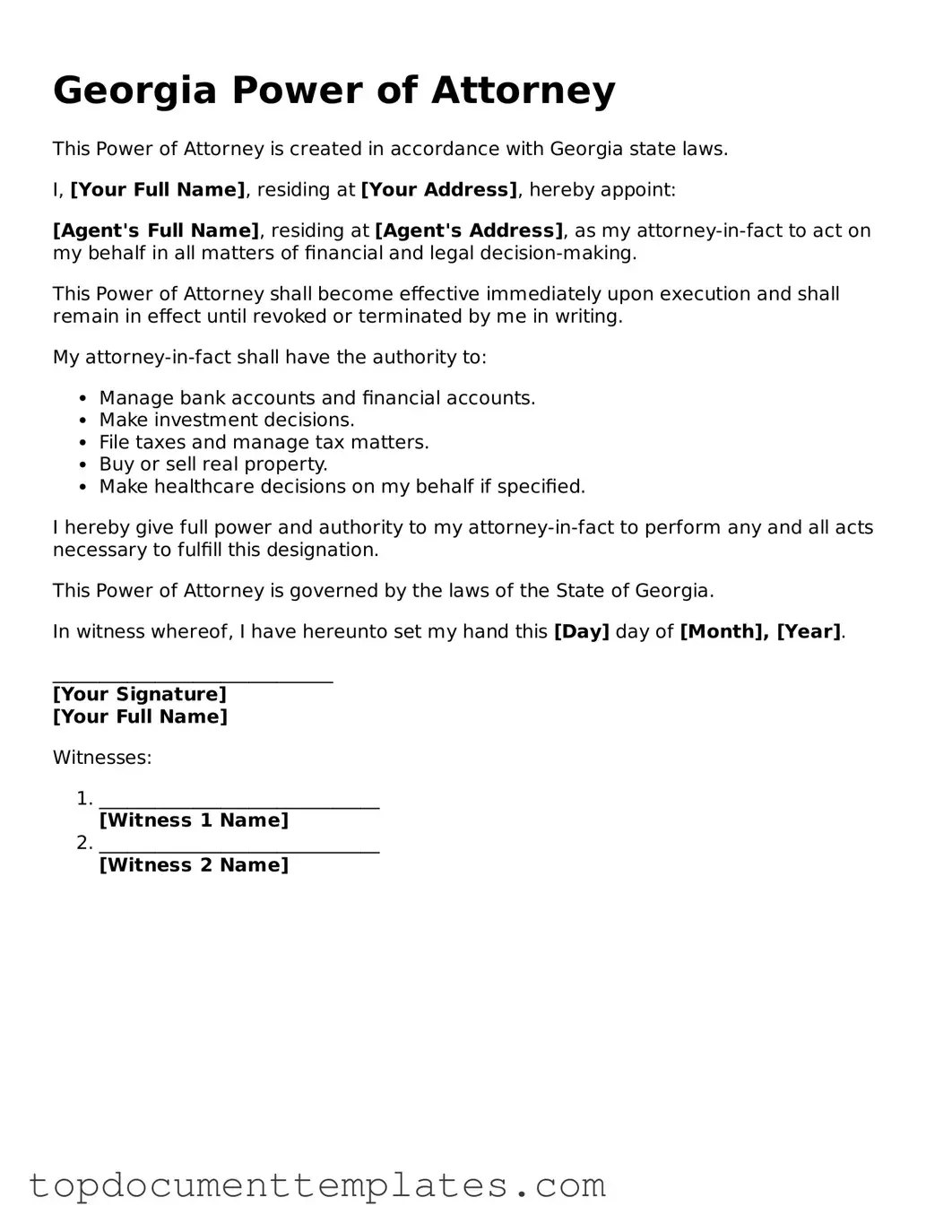Valid Power of Attorney Form for Georgia State
The Georgia Power of Attorney form serves as a crucial legal document that empowers an individual, known as the principal, to designate another person, referred to as the agent or attorney-in-fact, to make decisions on their behalf. This form can be tailored to fit specific needs, allowing the principal to grant broad or limited authority regarding financial, medical, or legal matters. In Georgia, the form must be signed by the principal and notarized to ensure its validity, providing a safeguard against potential misuse. It is essential for individuals to understand the implications of granting power of attorney, as the agent will have the authority to act in the principal's best interests, which may include managing bank accounts, signing documents, or making healthcare decisions. Additionally, the Georgia Power of Attorney form can be revoked at any time, offering flexibility and control to the principal. Understanding these key aspects can help individuals navigate the complexities of this important legal tool, ensuring that their wishes are respected even when they cannot voice them themselves.
Similar forms
The Power of Attorney (POA) form grants one person the authority to act on behalf of another in legal or financial matters. Several other documents share similarities with the POA, each serving a specific purpose in delegating authority or managing affairs. Below are six documents that are similar to the Power of Attorney:
- Living Will: This document outlines a person's wishes regarding medical treatment in the event they become unable to communicate. Like a POA, it designates someone to make decisions, but it specifically focuses on healthcare choices.
- Healthcare Proxy: A healthcare proxy allows an individual to appoint someone to make medical decisions on their behalf. This is similar to a POA but is limited to healthcare matters.
- Durable Power of Attorney: This is a specific type of POA that remains in effect even if the principal becomes incapacitated. It is similar to a general POA but provides ongoing authority during times of mental or physical decline.
- Financial Power of Attorney: This document specifically grants authority to manage financial matters. While it is a type of POA, it is tailored to address financial decisions exclusively.
- Trust Agreement: A trust agreement allows a person to transfer assets to a trustee, who manages them for beneficiaries. Like a POA, it involves delegating authority, but it focuses on asset management and distribution.
- Will: A will outlines how a person's assets will be distributed after their death. While it does not grant authority during a person’s lifetime, it similarly addresses the management of a person's affairs, albeit posthumously.
Guidelines on Writing Georgia Power of Attorney
Filling out a Georgia Power of Attorney form is an important step in designating someone to act on your behalf. After completing the form, you will need to sign it in the presence of a notary public. This ensures that the document is valid and legally recognized.
- Obtain the Georgia Power of Attorney form. You can find it online or at legal supply stores.
- Read the form carefully. Understand the responsibilities you are assigning to the agent.
- Fill in your name and address in the designated areas. This identifies you as the principal.
- Provide the name and address of the person you are appointing as your agent. This person will have the authority to act on your behalf.
- Specify the powers you are granting. You can choose general powers or limit them to specific tasks.
- Include the start date of the Power of Attorney. Decide if it will be effective immediately or at a later date.
- Sign and date the form. Make sure to do this in front of a notary public.
- Have the notary public sign and stamp the document. This step is crucial for the form’s validity.
- Distribute copies of the signed document to your agent and any relevant institutions, such as banks or healthcare providers.
File Information
| Fact Name | Description |
|---|---|
| Definition | A Georgia Power of Attorney form allows one person to grant another the authority to act on their behalf in legal or financial matters. |
| Governing Law | The form is governed by the Georgia Uniform Power of Attorney Act, O.C.G.A. § 10-6B-1 et seq. |
| Types of Authority | The form can grant general or specific powers, allowing the agent to manage finances, make healthcare decisions, or handle real estate transactions. |
| Agent Requirements | The agent must be at least 18 years old and mentally competent to act in the principal's best interest. |
| Durability | A Power of Attorney can be durable, meaning it remains effective even if the principal becomes incapacitated. |
| Revocation | The principal can revoke the Power of Attorney at any time, provided they are mentally competent. |
| Notarization | The form must be signed in the presence of a notary public to be legally valid in Georgia. |
| Witness Requirement | In addition to notarization, two witnesses must also sign the document, confirming the principal's identity and consent. |
| Use Cases | This form is commonly used for financial management, healthcare decisions, and real estate transactions when the principal cannot be present. |
Other Popular Power of Attorney State Forms
Power of Attorney Document - This form ensures that intentions and wishes are carried out according to the principal's desires.
Durable Power of Attorney Arizona - It's important to understand the power you grant to your chosen agent.
